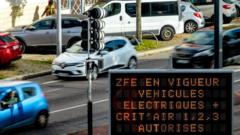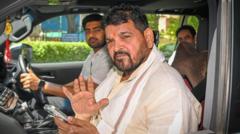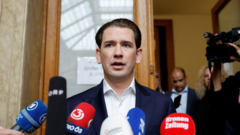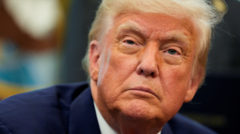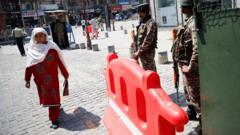As counting continues in the Delhi elections, the BJP is leading with early results showing the party ahead in 41 of the 70 assembly seats. The AAP follows with leads in 28 seats. The contest is crucial as both parties vie for control of India's capital amid a backdrop of high voter turnout and significant political stakes.
Delhi Election Race: BJP Takes Early Lead as Votes Are Counted

Delhi Election Race: BJP Takes Early Lead as Votes Are Counted
Prime Minister Modi's Bharatiya Janata Party shows strength in the ongoing Delhi election, edging ahead of the incumbent Aam Aadmi Party.
As the counting of votes commences in the recent Delhi assembly elections, Prime Minister Narendra Modi’s Bharatiya Janata Party (BJP) is currently leading with preliminary results indicating the party ahead in 41 of the 70 assembly seats. The incumbent Aam Aadmi Party (AAP) is trailing with leads in 28 seats, as per the data released by the Election Commission of India.
Over 60% of the 15 million registered voters participated in the election, demonstrating a strong electoral engagement. The pivotal dynamics of this election are underscored by the requirement of a minimum of 35 seats to form the government given the assembly's structure.
Initial exit polls suggested a possible outright majority for the BJP; however, analysts caution that such forecasts have often misrepresented outcomes in previous elections. Winning Delhi positions both parties strategically—symbolically and politically—as the capital carries significant importance in India's governance landscape.
The AAP, led by Arvind Kejriwal since 2013, has been recognized for its focus on welfare policies despite facing corruption allegations, which the party vehemently denies. Conversely, a BJP victory would mark a significant comeback for the party in Delhi, having last held power in 1998.
In the lead-up to the elections, the BJP mobilized considerable resources, leveraging a strategic campaign that included high-profile appearances from Modi and Home Minister Amit Shah. Meanwhile, the main national opposition, Congress, appears distant from the competition, having lost voter confidence after numerous corruption scandals led to its ousting in 2013.
Key local governance complexities, including a division of power that places control of public order and policing with a lieutenant governor appointed by the federal government, have led to heated political contests between the BJP and AAP. The campaigns largely centered on social issues such as education and health care rather than the political or identity-based concerns prevalent in other regional elections.
Notably, the issue of Delhi's severe air pollution crisis, which plagues the city for much of the year, did not feature prominently in the electoral debate. The BJP has pledged to cut the city's Air Quality Index in half by 2030 if it secures victory, yet this has remained largely overshadowed in the campaign dialogue.
The outcome of these tightly contested elections will likely serve as a barometer for Modi's popularity following the BJP's loss of an outright majority in the last general election, while simultaneously posing a severe test for the AAP as it strives to maintain its hold on power amid mounting challenges.








